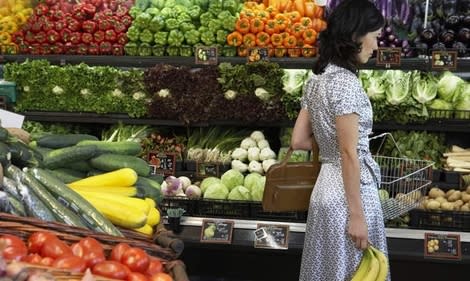5 Ways to Save Money on Groceries Without Coupons

Grocery shopping is a weekly chore that, well, seems to be doing more of the eating these days: Packaged foods and fresh vegetables and meats are eating up your paycheck while leaving your basket half empty. Groceries are getting more expensive, and because paychecks don't seem to be increasing, it's time to learn how to save by employing some simple tips and tricks - without the hassle of clipping coupons.
RELATED: 10 Money Saving Travel Tips
Lifestyle and entertaining expert Mindy Kobrin tells us that "It's easy to shop for food, but it's very hard to shop smart, and it's even harder to shop with inspiration." Even with aisles full of gorgeous packaging and colors, she notes, "the true inspiration comes when you enter your grocer with knowledge on your side on what to buy, when to buy it, and how to savor it in more ways than one."
RELATED: How to Save Money at the Meat Counter
Kobrin has put together some tips to help you save and become a smarter shopper. With her guidance, you can buy healthy foods for nutritious and satisfying meals without breaking the bank. Follow her tips to beat your budget, save on coupon-clipping time, and fill your basket to the brim with smart choices.
RELATED: Tips for Saving Money in the Kitchen
Shop Seasonally
Know what fruits and vegetables are in season to keep your costs reasonable at the market. As a family, the kids can help you create a seasonal produce chart to hang in the pantry or on the fridge. Couples and singles should keep a chalkboard or white board in their kitchen with the list as a reminder of what's super delicious at any given time of the year. Hey, sometimes you just forget!
Storage is Key
Store dry goods such as flour, sugar, nuts, dried fruits, pasta, and granola in airtight containers for a longer shelf life. These types of perishables are great to buy in bulk in order to keep costs low. Rather than buy individually packaged nuts and dried fruit for snacks, purchase a few reusable sandwich bags (washable and easy to slip in your pocket!) and create your own solo packs. Keep these either in the fridge or in any air-tight container for crispness.
RELATED: 12 Good, Fast, and Cheap Recipes
Buy in Bulk
Worried about having too much food in the house that will go uneaten, or worse, wind up in the trash? That's an easy fix! Buy in bulk with a friend or neighbor. Split perishables such as meat and dairy with your nearest and dearest. Package up your meats in freezer bags to cook only what you will eat for dinner.
RELATED: 10 Kitchen Tools That Will Save You Money
Buy Frozen Vegetables
Want to buy frozen vegetables? Don't feel bad about it - go right ahead! In fact, everyone should have plain frozen vegetables sans cheese or butter in their freezer. Add your frozen vegetables to a blender to make a powerhouse smoothie. Nothing fresh in your produce drawer? Thaw that frozen broccoli for a quick, healthy side. They're better than canned vegetables because there's no sugar, and frozen is often more affordable than fresh when not in season.
Know When to Shop Organic
Know the "Dirty Dozen" so you can prioritize organic food purchases. The most important foods to buy organic are apples, bell peppers, celery, cherry tomatoes, cucumbers, grapes, hot peppers, kale, peaches, potatoes, spinach, and strawberries.
Click here to see more ways to save money on groceries without using coupons
-Emily Jacobs, The Daily Meal
